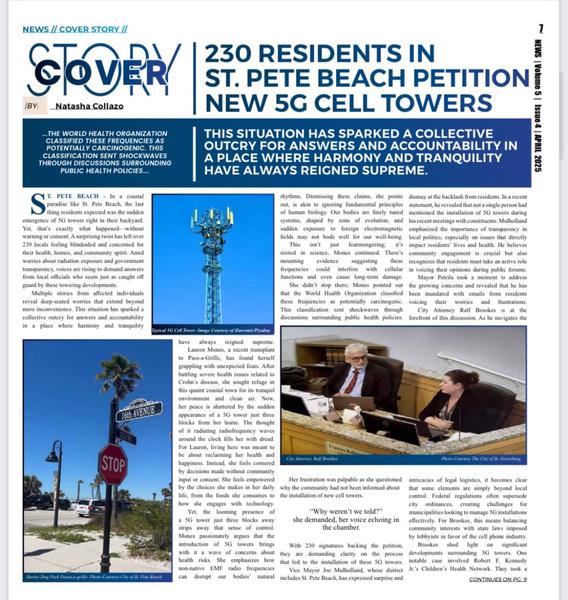17th March 2025
COVER STORY| 230 Residents in St.Pete Beach petition new 5G towrs
In a coastal paradise like St. Pete Beach, the last thing residents expected was the sudden emergence of 5G towers right in their backyard. Yet, that’s exactly what happened—without warning or consent. A surprising twist has left over 230 locals feeling blindsided and concerned for their health, homes, and community spirit. Amid worries about radiation exposure and government transparency, voices are rising to demand answers from local officials who seem just as caught off guard by these towering developments.
Multiple stories from affected individuals reveals deep-seated worries that extend beyond mere inconvenience. This situation has sparked a collective outcry for answers and accountability in a place where harmony and tranquility have always reigned supreme.
Lauren Mones, a recent transplant to Pass-a-Grille, has found herself grappling with unexpected fears. After battling severe health issues related to Crohn's disease, she sought refuge in this quaint coastal town for its tranquil environment and clean air. Now, her peace is shattered by the sudden appearance of a 5G tower just three blocks from her home. The thought of it radiating radiofrequency waves around the clock fills her with dread. For Lauren, living here was meant to be about reclaiming her health and happiness. Instead, she feels cornered by decisions made without community input or consent. She feels empowered by the choices she makes in her daily life; from the foods she consumes to how she engages with technology.
Yet, the looming presence of a 5G tower just three blocks away strips away that sense of control. Mones passionately argues that the introduction of 5G towers brings with it a wave of concerns about health risks. She emphasizes how non-native EMF radio frequencies can disrupt our bodies' natural rhythms. Dismissing these claims, she points out, is akin to ignoring fundamental principles of human biology. Our bodies are finely tuned systems, shaped by eons of evolution, and sudden exposure to foreign electromagnetic fields may not bode well for our well-being.
This isn’t just fearmongering; it's rooted in science-Mones continued.There’s mounting evidence suggesting these frequencies could interfere with cellular functions and even cause long-term damage.
She didn’t stop there; Mones pointed out that the World Health Organization classified these frequencies as potentially carcinogenic. This classification sent shockwaves through discussions surrounding public health policies.
Her frustration was palpable as she questioned why the community had not been informed about the installation of new cell towers.
"Why weren't we told?" she demanded, her voice echoing in the chamber. With 230 signatures backing the petition, they are demanding clarity on the process that led to the installation of these 5G towers.
Vice Mayor Joe Mulholland, whose district includes St. Pete Beach, has expressed surprise and dismay at the backlash from residents. In a recent statement, he revealed that not a single person had mentioned the installation of 5G towers during his recent meetings with constituents. Mulholland emphasized the importance of transparency in local politics, especially on issues that directly impact residents’ lives and health. He believes community engagement is crucial but also recognizes that residents must take an active role in voicing their opinions during public forums.
Mayor Petrila took a moment to address the growing concerns and revealed that he has been inundated with emails from residents voicing their worries and frustrations.
City attorney Ralf Brookes is at the forefront of this discussion,as he navigates the intricacies of legal logistics, it becomes clear that some elements are simply beyond local control. Federal regulations often supersede city ordinances, creating challenges for municipalities looking to manage 5G installations effectively. For Brookes, this means balancing community interests with state laws imposed by lobbyists in favor of the cell phone industry. Brookes sheds light on significant developments surrounding 5G towers. One notable case involved Robert F. Kennedy Jr.'s Children's Health Network. They took a bold step by filing a lawsuit against the FCC. Their determination paid off when they won the case, drawing attention to health concerns linked to electromagnetic radiation from cell towers. The implications of this legal win may influence future decisions regarding 5G infrastructure across cities nationwide.
The recent appointment of a new leader at the FCC has sparked renewed interest in the regulatory landscape surrounding 5G technology. With this change, many are hopeful for advancements that could reshape how telecommunications operate within our communities. As the FCC reviews existing policies and begins to implement changes, stakeholders are paying close attention. The aim is to balance innovation with public safety and health concerns.
In 2017, the FL legislature approached by lobbyists introduced a state law that effectively prevents cities from rejecting small cell wireless communication facilities within their right of way.
One important aspect is the ability to require registration and authorization from the Federal Communications Commission (FCC). This step ensures that we have a degree of oversight in our communities. By mandating this process, we can gather essential information about tower installations. It allows us to assess potential impacts on public spaces and health concerns. Each new installation must align with existing regulations, giving local authorities some control over how these technologies integrate into our neighborhoods.
Brookes states we have done many things we are allowed to do and have asked for them to move the towers but were rejected.However, we're not giving up. There’s a commitment to revisiting potential strategies that could give us more control over tower placements, particularly along the beach area. We’ll explore new approaches and engage in conversations with stakeholders once again, he concluded.









